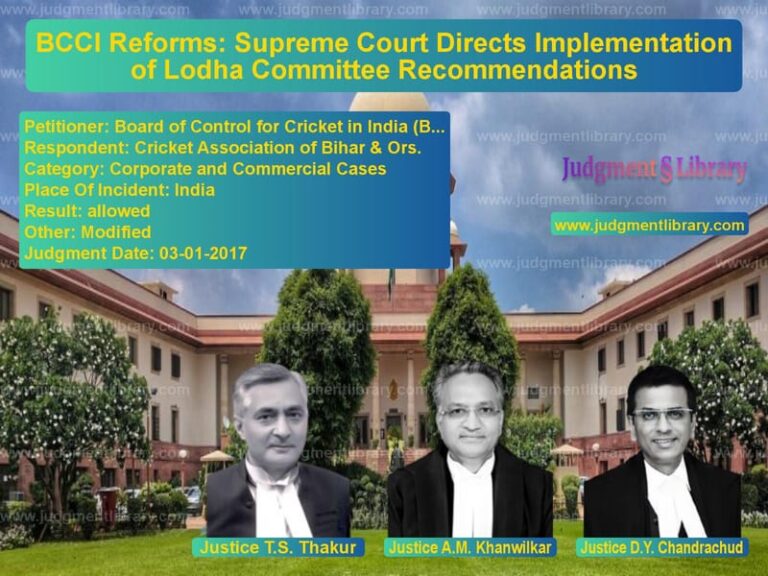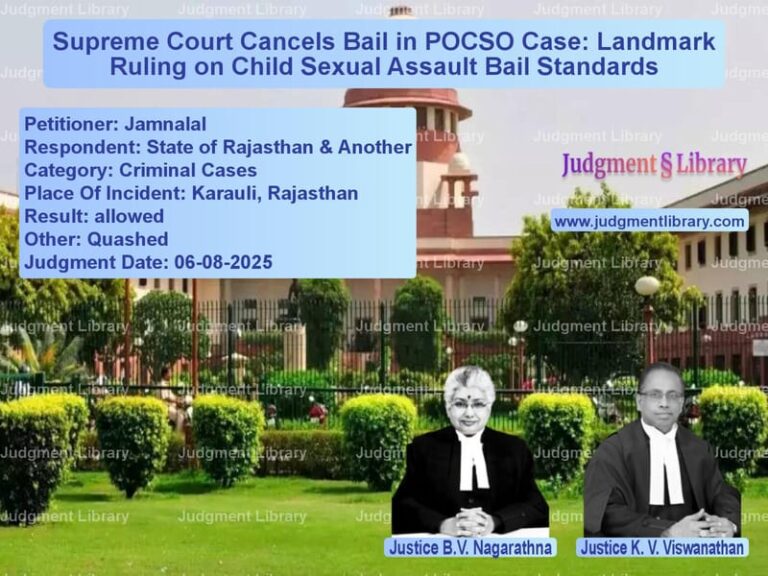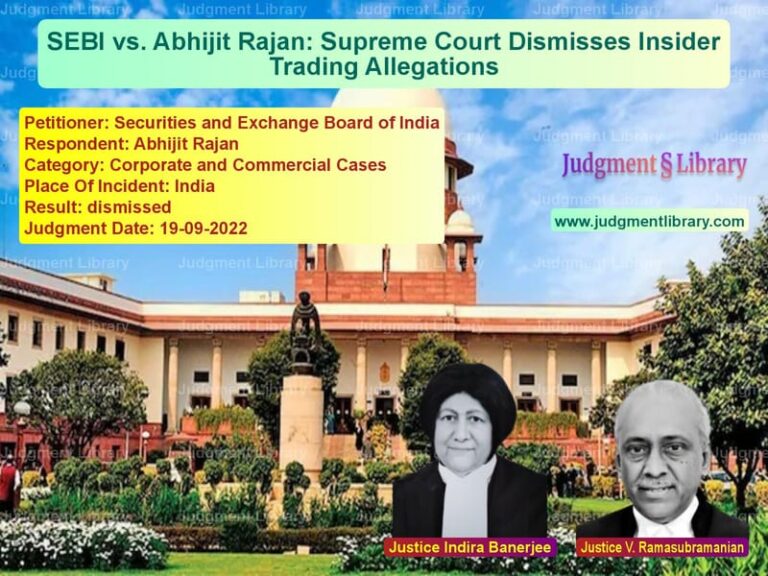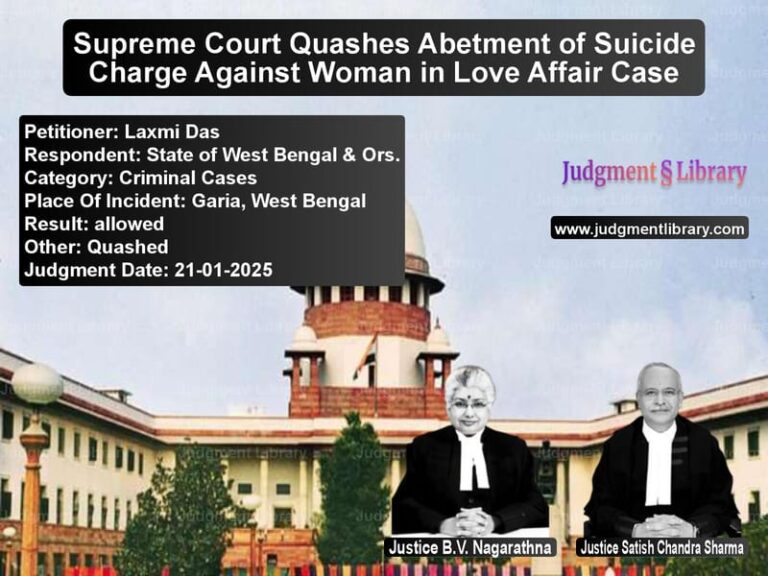Supreme Court Allows Secondary Evidence in Land Sale Agreement Dispute
The Supreme Court of India recently ruled in Vijay vs. Union of India & Ors., addressing a long-standing land sale agreement dispute. The case primarily dealt with the admissibility of secondary evidence under the Indian Evidence Act, 1872 and the applicability of Section 35 of the Indian Stamp Act, 1899. The Court set aside the decisions of the lower courts, allowing the petitioner to introduce a copy of the sale agreement as secondary evidence.
Background of the Case
The dispute arose from an agreement to sell dated February 4, 1988, between the plaintiff and the defendant. The plaintiff claimed that the defendant had executed the agreement and handed over possession of the land, but later denied its existence. Consequently, the plaintiff filed a suit for specific performance of contract and sought to introduce a copy of the sale agreement as secondary evidence.
The trial court initially allowed the application to admit the copy as secondary evidence. However, upon a review petition by the defendant, the trial court reversed its decision, citing that the agreement was not duly stamped and, therefore, barred under Section 35 of the Stamp Act. The Madhya Pradesh High Court upheld this decision, leading to an appeal before the Supreme Court.
Arguments by the Petitioner (Vijay)
The petitioner contended:
- Section 35 of the Stamp Act does not apply because there was no requirement to pay stamp duty at the time of execution of the agreement (prior to the 1989 Amendment).
- The agreement should be admitted as secondary evidence under Section 65 of the Evidence Act.
- The document was executed before the amendment requiring stamp duty on agreements to sell, making the prohibition inapplicable.
- The lower courts erroneously relied on Jupadi Kesava Rao v. Pulavarthi Venkata Subha Rao (1971) without considering the factual distinctions.
Arguments by the Respondent (Union of India & Ors.)
The respondents countered these claims, arguing:
- A copy of an unstamped or deficiently stamped document cannot be impounded, validated, or admitted as secondary evidence.
- Once the original document is inadmissible under the Stamp Act, its photocopy cannot be introduced as secondary evidence.
- The prohibition of Section 35 is absolute, barring both primary and secondary evidence of improperly stamped documents.
Supreme Court’s Observations
The Supreme Court carefully examined the provisions of the Stamp Act and the Evidence Act. Key observations included:
- On the Applicability of Section 35 of the Stamp Act: The Court clarified that only documents chargeable with duty at the time of execution fall under Section 35. Since the agreement was executed in 1988, before the amendment requiring stamp duty, it was not covered under the prohibition.
- On the Admissibility of Secondary Evidence: The Court ruled that when a document is not required to be stamped at the time of execution, a copy can be introduced as secondary evidence if other legal conditions under Section 65 of the Evidence Act are satisfied.
- On the Lower Courts’ Interpretation: The Court found that the trial court and High Court had incorrectly applied the ruling in Jupadi Kesava Rao, as that case involved a document that was chargeable with duty at the time of execution.
Key Excerpt from the Judgment
“The bar under Section 35 of the Stamp Act applies only when an instrument is chargeable with duty at the time of execution. In the present case, the agreement was not chargeable at that time, and therefore, the prohibition does not apply. The plaintiff is entitled to introduce the copy as secondary evidence, provided the other requirements under the Evidence Act are satisfied.”
The Court emphasized that denying secondary evidence without proper consideration of statutory provisions would be unjust.
Final Judgment and Directions
The Supreme Court ruled:
- The appeal was allowed, and the High Court’s judgment was set aside.
- The order of the trial court rejecting secondary evidence was quashed.
- The copy of the agreement to sell was permitted to be introduced as secondary evidence.
- The trial court was directed to decide on its evidentiary value independently under the Evidence Act.
This ruling clarifies the conditions under which secondary evidence of unstamped documents can be admitted and reinforces the importance of considering legislative amendments while interpreting statutory prohibitions.
Petitioner Name: Vijay.Respondent Name: Union of India & Ors..Judgment By: Justice Abhay S. Oka, Justice Sanjay Karol.Place Of Incident: Madhya Pradesh.Judgment Date: 29-11-2023.
Don’t miss out on the full details! Download the complete judgment in PDF format below and gain valuable insights instantly!
Download Judgment: vijay-vs-union-of-india-&-ors-supreme-court-of-india-judgment-dated-29-11-2023.pdf
Directly Download Judgment: Directly download this Judgment
See all petitions in Contract Disputes
See all petitions in Property Disputes
See all petitions in Specific Performance
See all petitions in Damages and Compensation
See all petitions in Judgment by Abhay S. Oka
See all petitions in Judgment by Sanjay Karol
See all petitions in allowed
See all petitions in Quashed
See all petitions in supreme court of India judgments November 2023
See all petitions in 2023 judgments
See all posts in Civil Cases Category
See all allowed petitions in Civil Cases Category
See all Dismissed petitions in Civil Cases Category
See all partially allowed petitions in Civil Cases Category







